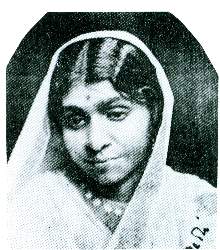 Sarojini Naidu, at one time acclaimed a the reigning queen of English poetry and fondly referred to as Bulbul-e-Hind, was born on 13th February, 1879 in a Bengali family which migrated to Hyderabad in 1878. Her father, Dr. Aghorenath Chattopadhyaya, was a brilliant scholar who obtained the D. Sc. degree from Edinburgh University besides winning the coveted Baxter prize in Physical science and Hope prize in Chemistry.
When Dr. Chattopadhyaya returned to India, Nawab Mahboob Au Khan Nizam VI requisitioned his services to improve the education system. Sarojini Naidu, at one time acclaimed a the reigning queen of English poetry and fondly referred to as Bulbul-e-Hind, was born on 13th February, 1879 in a Bengali family which migrated to Hyderabad in 1878. Her father, Dr. Aghorenath Chattopadhyaya, was a brilliant scholar who obtained the D. Sc. degree from Edinburgh University besides winning the coveted Baxter prize in Physical science and Hope prize in Chemistry.
When Dr. Chattopadhyaya returned to India, Nawab Mahboob Au Khan Nizam VI requisitioned his services to improve the education system.
Dr Chattopadhyaya accomplished the task entrusted to him so well that he came to be regarded as the father of education in Hyderabad State.
Sarojini Naidu was brought up in the lap of luxury. Her father appointed an English governess and a French governess to give her excellent training. Later he appointed a Persian teacher as she took Persian as a second language in her school course. She passed the matriculation examination of Madras University when she was only 12. By the time she was 14 she had read all the English poets, her favourites being Shelley, Tennyson and Browning.
Her play in English “Meher Muneer” written soon after her
matriculation so impressed Nizam VI that he granted a foreign scholarship
with first class passage in 1895.
In England she had the privilege of being the ward of the great Miss
Manning, who was the pioneer for Indian students in England.
At 18 she was admitted to Girton College but she found university life
boring. Due to ill-health she left college for the health resorts in the
continent and visited Italy and Switzerland.
Years later she published her first volume of poetry and again two more volumes. Her maturer work, “The Bird of Time” was of such quality that Sir Edmund Gosse, the well-known critic, said there was nothing, almost nothing, which the severest criticism could call in question. Returning to Hyderabad in September, 1898 Sarojini married Dr. M.G. Naidu.
Attracted to politics in a strange way she chose service for the motherland and left her home, husband and children.
Her first public service was to bring about unity between Hindus and Muslims. She addressed a huge gathering of Muslims in 1913. At the Bombay Congress in 1915 she spoke in support of a resolution on Self-Government.
Later she fought for the political equality of Indian women and went to England as a member of the All-India Home Rule League deputation. She also attended the second Round Table Conference in London. She was very close to the Nehru family and served as the Governor of West Bengal.
|